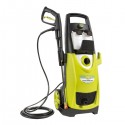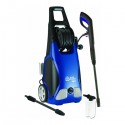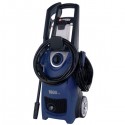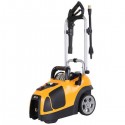Electric Pressure Washer Reviews
These are the 10 best electric pressure washers based on product quality, customer satisfaction, and price:
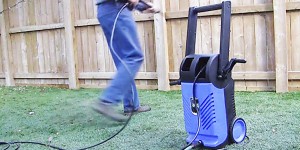 In this era of rising gas prices and widespread concern over the effects of carbon emissions based pollution, more and more consumers are making the switch from gas powered vehicles and machines to electric alternatives. This is evidenced by the rising popularity of hybrid and fuel efficient cars, energy efficiency ratings on home appliances, and a general trend towards using more renewable energy. There are plenty of reasons beyond environmental concerns to make the switch over to electric home and garden machines such as pressure washers.
In this era of rising gas prices and widespread concern over the effects of carbon emissions based pollution, more and more consumers are making the switch from gas powered vehicles and machines to electric alternatives. This is evidenced by the rising popularity of hybrid and fuel efficient cars, energy efficiency ratings on home appliances, and a general trend towards using more renewable energy. There are plenty of reasons beyond environmental concerns to make the switch over to electric home and garden machines such as pressure washers.
Electric machines can often be much cheaper than gas powered ones, particularly when it comes to small engine machines like pressure washers. These models are not only less expensive up front, but they also provide long term savings because electricity is cheaper than gas, and pressure washers with electric motors often do not require the kind of expensive maintenance to keep them working well that gas powered appliances do.
Electric pressure washers generally have slightly lower flow rates and produce streams that are lower in terms of pounds per square inch than gas powered pressure washers do, but they still have an extremely versatile range of applications, and they are more than well equipped enough to easily tackle the majority of jobs you could need them for. Electric pressure washers generally tend to have flow rates of about 1.5 gallons per minute and pressures of about 1500 to 2500 pounds per square inch.
These are impressive specs, and they provide electric pressure washers with enough power to take care of virtually every residential application you could think to use them for. These specs are also what you need in a pressure washer if you are using it for a small scale subcontracting or a landscaping business.
Electric pressure washers can be applied to a wider range of household chores than you might think. These machines hook up to any household tap and power outlet, and you are ready to go. Electric pressure washers are perfect for washing your car or SUV. They can be used to clean the grime and grit that builds up on storm windows through the fall and winter, and you can quickly rinse off screens before you attach them in the summer as well.
You can clean vinyl siding, fences, and walls with electric pressure washers. Garbage cans, lawn furniture, and even your driveway or garage floor can be cleaned quickly and efficiently with an electric pressure washer. In the event that you are dealing with an obstinate stain or trying to remove a substance that is not water soluble, you can combine detergent or chemical solvents with the water spray for more cleaning power.
One of the most significant advantages that electric pressure washers have over gas powered ones is the fact that they do not produce any emissions or fumes. That means you can safely use an electric pressure washer indoors or in an enclosed space without having to worry about safety issues. These are versatile, powerful cleaning machines that can handle tough jobs.
1. Electric Pressure Washer Selection Criterias
1a. Pressure & Flow Rate
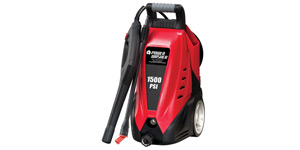 When you are selecting an electric pressure washer, one of the first things you want to look at is the different pressures and flow rates offered by each machine. Pressure is measured in pounds per square inch and indicates the force with which water will be hitting whatever surface you aim the spray at. Flow rate is measured in gallons per minute and indicates how much water will be running through the hose at a given time.
When you are selecting an electric pressure washer, one of the first things you want to look at is the different pressures and flow rates offered by each machine. Pressure is measured in pounds per square inch and indicates the force with which water will be hitting whatever surface you aim the spray at. Flow rate is measured in gallons per minute and indicates how much water will be running through the hose at a given time.
When you combine pressure and flow rate, you get a sense of how much total power a pressure washer can provide: pressure times flow rate equals cleaning units. A machine that has a high PSI rating but a low flow rate will be able to produce a highly concentrated and powerful, but also very thin, stream of water. A machine that has a low PSI rating and a high flow rate will have a broad stream of water that is not very powerful. The ideal machine will have a high PSI and flow rate.
On electric pressure washers, the PSI rating generally falls between 1500 and 2500. This is a lot of power: coin operated car washes’ wands generally have PSI ratings of about 700, which itself is pretty high. When you are selecting a new electric pressure washer, you do not necessarily need to find one with the highest PSI rating, but if you can find one that is above 2000 PSI at a reasonable price, you can be fairly certain that it will have enough power to be able to handle just about any job you could need it for. The PSI rating indicates the maximum PSI setting a machine can produce; you can always dial back the PSI with different nozzles if you are washing delicate surfaces like glass or window screens.
The flow rate on electric pressure washers is typically between 1.5 and 2.0 gallons per minute. Just as with PSI ratings, you do not have to find the highest flow rate on your washer, but again it can’t really hurt. Again, you will have the option to reduce the flow rate to a lower setting than the max that is listed. At the same time, you should not be looking at the PSI and flow rate independently of one another, because what really matters is their combined cleaning unit rating as described above. Any CU above 2,500 should be sufficient.
1b. Style
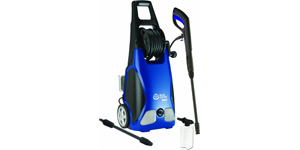 There are a number of different styles of electric pressure washers, and the one you decide to buy will depend largely on what you intend to use it for. The electric pressure washer’s style determines a number of other factors, including its size and weight – which affect its maneuverability and ease of use – as well as what kinds of projects it can handle, its mobility, and its price.
There are a number of different styles of electric pressure washers, and the one you decide to buy will depend largely on what you intend to use it for. The electric pressure washer’s style determines a number of other factors, including its size and weight – which affect its maneuverability and ease of use – as well as what kinds of projects it can handle, its mobility, and its price.
Hand held electric pressure washers are the smallest and most mobile units, but they are also the most limited ones in terms of PSI and flow rate. These units can be easily carried around your house or job site, provided you do not need to go too far away from a power source. The price of handheld electric pressure washers can vary quite a bit; less expensive models have lower PSI and flow rate ceilings and have traditional axial pumps, while more expensive models also offer warm water options (up to 180 degrees F) and have more state of the art triplex plunger pumps.
Wall mounted electric pressure washers are stationary and intended for use in garages, car dealerships, car washes, or restaurant kitchens. These models are commonly available with relatively high PSI and flow rates, and often have hot water options, which is useful when they are used in food processing or restaurant settings, which require sanitizing, or in garages, which often have oil or grease stains that are tougher to remove with just cold water. Most wall mounted electric pressure washers are wired into existing electrical systems, rather than plugging into an outlet. They typically require about a 220 volt capacity, so it is important to make sure your wiring can support that kind of load.
Mobile plug in electric pressure washers are typically mounted on a metal frame with wheels, so they can be plugged in, hooked up to a water supply, and easily rolled around your yard, house, or job site. These machines’ ranges are limited only by the length of the intake hose and extension cord, so while they are not ideal for big job sites, they will be able to navigate most moderately sized areas. They are most commonly cold water only, although they do have intakes for adding detergents or chemical solvents. Hot water units are also available that can reach 200 degrees F, but these tend to be quite expensive and require at least 230 volt circuit breakers.
1c. Motor & Pump
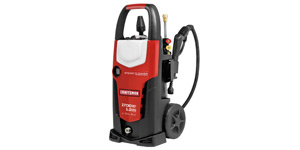 The kind of motor and pump in your electric pressure washer are rather technical features that a lot of consumers may feel they do not have the necessary expertise to factor into their analysis of whether a particular model is right for them or not, but there are a few basic things about each of them that are fairly easy to familiarize yourself with. These features are important because the kind of motor an electric pressure washer is using will determine what kind of outlets you can use it with and the amount of power it produces, and the pump type is going to influence its efficiency and lifespan.
The kind of motor and pump in your electric pressure washer are rather technical features that a lot of consumers may feel they do not have the necessary expertise to factor into their analysis of whether a particular model is right for them or not, but there are a few basic things about each of them that are fairly easy to familiarize yourself with. These features are important because the kind of motor an electric pressure washer is using will determine what kind of outlets you can use it with and the amount of power it produces, and the pump type is going to influence its efficiency and lifespan.
Motors on electric pressure washers are all basically the same design, and the majority of them use alternating current power sources, although some units exist that can be universally used with alternating or direct current power. For the most part, a basic AC motor will be best for the majority of users. Beyond that, it is important to look at the amperage and wattage of the motor; these specs should be listed along with others like PSI and flow rate. Most electric pressure washers have amperages that clock in between 10 and 15 amps, and wattages between 1600 and 2000. Higher wattage and amperage is attractive, because it means the motor will be able to supply more power to the pressure washer, increasing its PSI. But you should take care to make sure you are not buying a model that has an amperage rating that will overload whatever circuit breaker you are running it on. Generally, it is a safe bet for the majority of household breakers to run an electric motor that is between 12 and 14 amps.
There are two types of pumps available on electric pressure washers: axial and triplex. Axial pumps are the older and more standard of the two kinds. They have a series of pistons arrayed in a circle inside the cylinder block. Triplex pumps have three pistons that are arrayed parallel to one another. Triplex pumps are able to produce more pressure in a smaller overall footprint. They also have fewer working parts, which increases their total lifespan and makes them less prone to breaking down or needing replacement. But triplex pumps are also less common than axial pumps, and generally tend to make the electric pressure washer more expensive. For the majority of small, residential-style jobs, axial pumps are sufficient, although contractors who intend to use their pressure washers a lot may want one with a triplex pump.
1d. Accessories & Design
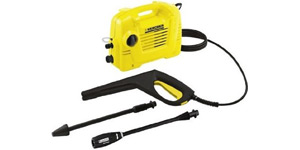 Once you have determined which style is best for the job you will be using it on, narrowed down your pressure and flow rate to an acceptable range, and determined which pump and motor are best for you, you will probably have a very good idea of what kind of electric pressure washer you want to buy. At this point, it is time to start looking at the finer points of each electric pressure washer, and these boil down to accessories and design. Accessories include features like the hose, wand, nozzle tips, and detergent sources; design includes features like the size, weight, and other aspects of the machine as a whole.
Once you have determined which style is best for the job you will be using it on, narrowed down your pressure and flow rate to an acceptable range, and determined which pump and motor are best for you, you will probably have a very good idea of what kind of electric pressure washer you want to buy. At this point, it is time to start looking at the finer points of each electric pressure washer, and these boil down to accessories and design. Accessories include features like the hose, wand, nozzle tips, and detergent sources; design includes features like the size, weight, and other aspects of the machine as a whole.
In terms of accessories, you want to choose an electric pressure washer that has the kind of versatility that gives you a lot of options so you can use it on a wide variety of projects without losing anything in terms of power or performance. For example, it is important to make sure the hose on the electric pressure washer is sufficiently long enough that you can move away from the machine while you are washing a surface, rather than having to pull it along behind you. A hose that is at least 20 or 25 feet long is a necessity.
The amount of pressure the wand is producing can be controlled in one of two ways: certain gun wands allow you to set the pressure by how hard you are pulling the trigger, while most electric pressure washers come with a set of different sized nozzle tips that produce sprays with varying PSIs. While the latter option is a bit more work to switch from one pressure to another, it is also usually a lot cheaper than the former. If you do opt for a nozzle tip based pressure system, it’s important to make sure that you are getting a sufficient range of nozzle tips for a variety of jobs.
I strongly recommend finding a pressure washer that has at least some way of mixing detergent or chemical solvents with the water spray. These can either be via a siphoning hose that goes directly into the detergent source or a reservoir on the pressure washer that you can fill with detergent.
Finally, take note of the dimensions and weight of the electric pressure washer. More compact pressure washers are easier to store, and lightweight ones are easier to maneuver. Maneuverability is also improved with bigger wheels and a well-designed frame.
1e. Price
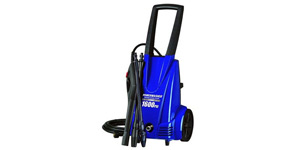 At this point in your search, you should have been able to narrow down your selection to one of just a handful of pressure washers. You will have determined the PSI and flow rate you need, whether you need a handheld, wall mounted, or rolling electric pressure washer, the power and pump style, and figured out which models have the best overall design and most accessories. Now the only thing that remains is determining how much you should have to pay for your electric pressure washer.
At this point in your search, you should have been able to narrow down your selection to one of just a handful of pressure washers. You will have determined the PSI and flow rate you need, whether you need a handheld, wall mounted, or rolling electric pressure washer, the power and pump style, and figured out which models have the best overall design and most accessories. Now the only thing that remains is determining how much you should have to pay for your electric pressure washer.
The different styles and sizes of electric pressure washers will each have their own price ranges, and some are far more expensive than others. For example, a handheld pressure washer with high PSI and flow rate that can produce hot water as well as cold and has a triplex pump is going to be a lot more expensive than a basic cold water pressure washer with moderate PSI and an axial pump. But within each category there is also going to be some variation in price, and it can be difficult to determine what you should expect to pay.
It is a good rule of thumb when you are buying a new appliance or tool (or anything else, for that matter) that you do not want to buy the most expensive model, but you also want to avoid the least expensive model. This is because machines that are at the top of their price range are typically going to be just as good and well made as those at the middle of the price range, while those that are at the bottom of the price range are going to be cheaply manufactured and have poor quality parts and craftsmanship. So I typically try to find a model that is somewhere in the middle of the price range.
But more importantly, you should shop less based purely on pricing and more based on the quality of the parts and manufacturing a model has. Its parts should be made out of durable materials like welded or stamped steel or aluminum instead of plastic. You want treaded rubber wheels and a solid but lightweight frame if possible. And you should find a brand name that has a solid reputation. If possible, try to find a model that is high quality but has recently been marked down, rather than buying a low quality model that has a lower base price.
2. Best Electric Pressure Washer Reviews
Karcher K5.85 M Plus 




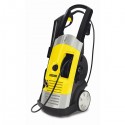
Karcher K5.85M Plus is the kind of superior residential pressure washer that you will certainly want to purchase if you have lots of big cleanup jobs to take care of around the house. As soon as you get it out of the box, it will be pretty obvious that this is a pressure washer that [...]
Karcher K3.540 




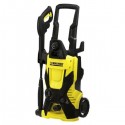
Karcher K3.540 is one of the only pressure washers to feature a completely unique, patented water-cooled induction motor that allows for better overall performance and a much longer life. The pump powers a direct-drive pump that delivers superior pressure and never needs maintenance to keep it running smoothly. The Karcher K3.540 comes with two spray [...]
Karcher K5.540 




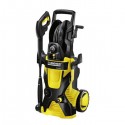
The Karcher K5.540 is designed to provide high performance and serious power in a small, lightweight package. It is convenient and very easy to use, and it has a number of excellent accessories designed for this purpose. It comes with multiple wands for tackling different kinds of jobs, an onboard detergent reservoir, and a Quick [...]
AR Blue Clean AR142P 




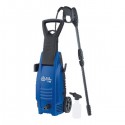
AR Blue Clean AR142P is an electric pressure washer with lots of cleaning power and a number of other excellent advantages. Unlike a gas powered residential pressure washer, the AR Blue Clean AR142P is never going to need an oil change or tune-up, and you will not have to keep smelly gas cans in your [...]
AR Blue Clean AR118 




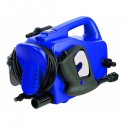
The AR Blue Clean AR118 is designed with convenience and portability in mind. It is very lightweight, at just under twelve pounds, and it is quite compact as well, with a big handle that makes it easy to carry with you as you clean your deck, walls, or other surfaces. But it also has a [...]
These are the 10 best electric pressure washers based on product quality, customer satisfaction, and price:

